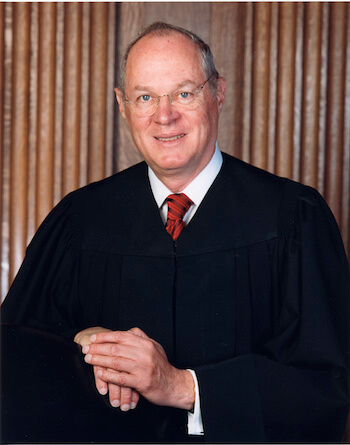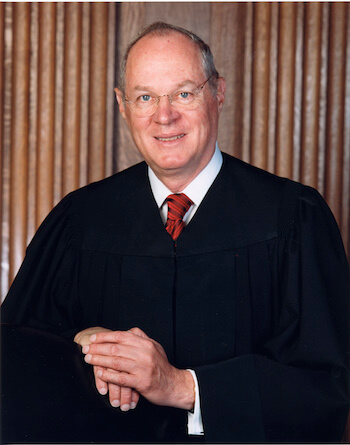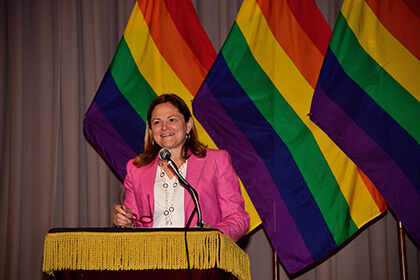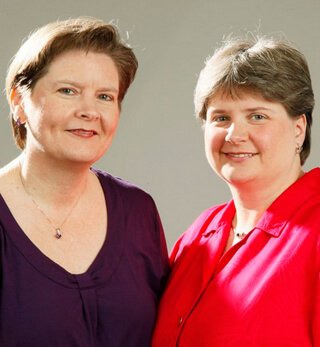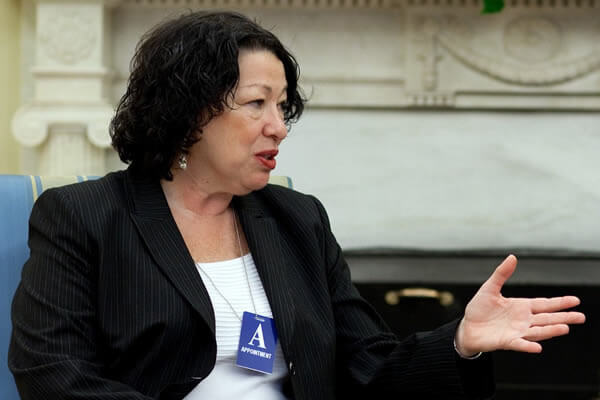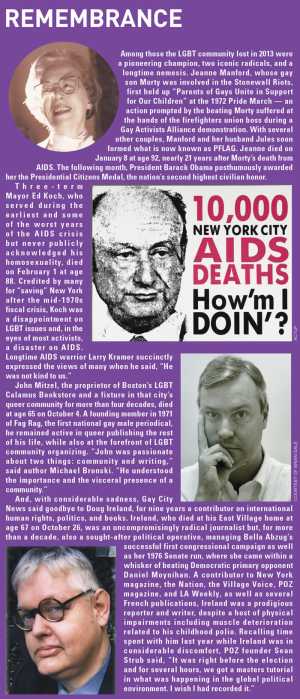BY ARTHUR S. LEONARD | With the death of Antonin Scalia, the Supreme Court has lost its most outspoken anti-gay member. Ever since taking his seat on the high bench in 1986, Justice Scalia voted consistently against gay rights claims, sometimes in the majority and sometimes in dissent, regardless of the factual context in which they arose.
Scalia was appointed to the high court by President Ronald Reagan shortly after it had decided Bowers v. Hardwick (1986), the notorious case in which it rejected by a 5-4 vote a constitutional challenge to Georgia’s law making gay sex a crime. There is no doubt how he would have voted in that case, since he subsequently argued — in dissent, in the 2003 Lawrence v. Texas case — that it had been correctly decided and should be reaffirmed and followed.
The first LGBT rights case to come up after his appointment, during Scalia’s first term on the court in 1987, was San Francisco Arts & Athletics v. US Olympic Committee. The Olympic Committee sued for an injunction to stop SFAA from holding its international athletic competition under the name “Gay Olympics.” The Supreme Court ruled that the USOC had a right under a federal statute to veto the use of “Olympics” in connection with athletic competitions run by other organizations, and that the statute did not violate the First Amendment free speech rights of others who wanted to run their own “Olympic” games.
Firebrand on losing side of major LGBT rulings advanced “dead” Constitution view only haltingly
Scalia joined the majority opinion by Justice Lewis Powell. The court refused to entertain the argument that USOC’s discriminatory exercise of its veto — allowing many other organizations to use “Olympic” in their name unchallenged — raised a constitutional issue. The USOC was not a governmental organization, and thus, the court held, not bound by the equal protection requirement.
Justices William J. Brennan and Thurgood Marshall dissented in full, and two other justices — Sandra Day O’Connor and Harry Blackmun — also opined that the case should be sent back to a lower court for further consideration of an equal protection challenge.
The high court ruled in 1988 that a gay man who had been discharged by the Central Intelligence Agency had a right to seek judicial review of his claim that he was a victim of unconstitutional discrimination, with Chief Justice William Rehnquist writing the decision for the court. Scalia, who normally voted in line with the chief justice, penned a lengthy dissent, arguing that Congress had insulated such CIA personnel decisions from judicial review and was constitutionally entitled to do so.
Scalia subsequently joined a dissent by Justice Anthony M. Kennedy in 1989 in Price Waterhouse v. Hopkins, a case in which a majority of the court accepted the argument that an employer who takes adverse action against an employee because she fails to conform to gender stereotypes may be violating the sex discrimination ban in Title VII of the Civil Rights Act of 1964.
Justice Brennan’s opinion for a plurality of the court influenced lower courts to adopt a broader approach to Title VII’s ban on sex discrimination, leading ultimately to provide protection to transgender plaintiffs and even some gay plaintiffs who can make a plausible claim that they encounter workplace discrimination because of their failure to conform with gender stereotypes. Although the Kennedy dissent that Scalia joined focused mainly on other issues in the case, it voiced skepticism about the “sex stereotyping” theory.
Scalia’s hostility toward gay rights claim came into full view in 1996, when he “vigorously” dissented (to use his descriptive word) from the Supreme Court’s 5-4 ruling in Romer v. Evans, which held that Colorado Amendment 2 violated the equal protection rights of gay people. That voter initiative prohibited the state or its political subdivisions from adopting legislation that would protect gay people from discrimination. The case provided Scalia with his first vehicle to accuse the court of signing on to a gay rights agenda, because it was its first potentially wide-ranging pro-gay rights decision.
“The constitutional amendment before us here is not the manifestation of a ‘bare… desire to harm’ homosexuals,” he wrote, refuting Justice Kennedy’s reasoning for the majority, “but is rather a modest attempt by seemingly tolerant Coloradans to preserve traditional sexual mores against the efforts of a politically powerful minority to revise those mores through use of the laws.”
The description of “seemingly tolerant Coloradans” who had voted overwhelmingly to enact Amendment 2 in the wake of a horrifyingly homophobic media campaign drew shocked guffaws from LGBT commentators.
Scalia continued, “This Court has no business imposing upon all Americans the resolution favored by the elite class from which the Members of this institution are selected, pronouncing that ‘animosity’ toward homosexuality is evil.”
Scalia thereby dismissed the court’s majority as in league with the organized bar and the law school community, which had condemned anti-gay discrimination and moved to deny discriminatory recruiters access to law school placement offices. After summarizing Kennedy’s rationale for the decision in sarcastic terms, Scalia insisted that by such reasoning “constitutional jurisprudence has achieved terminal silliness.” Arguing that the court’s ruling was inconsistent with Bowers v. Hardwick, he accused the majority of overruling that case without saying so. If it was constitutional to make gay sex a crime, he asked, how could it be a violation of equal protection for a state to refuse to protect homosexuals from discrimination?
Pushing the point further, Scalia wrote, “Of course it is our moral heritage that one should not hate any human being or class of human beings. But I had thought that one could consider certain conduct reprehensible — murder, for example, or polygamy, or cruelty to animals — and could exhibit even ‘animus’ toward such conduct. Surely that is the only sort of ‘animus’ at issue here: moral disapproval of homosexual conduct, the same sort of moral disapproval that produced the centuries-old criminal laws that we held constitutional in Bowers.”
He went on at length in a similar vein, ultimately accusing the court of ruling based on politics rather than law, and arguing for the right of individuals who did not want to associate with homosexuals in their workplaces to refuse to employ them.
This dissent set the pattern for Scalia’s increasingly strident dissents as he found himself on the losing side in Lawrence v. Texas (2003), United States v. Windsor (2013), and Obergefell v. Hodges (2015), the cases in which the high court struck down sodomy laws, the anti-gay Defense of Marriage Act, and state laws against same-sex marriage. These dissents were littered with colorful phrases one would not expect to find in the normally staid volumes of Supreme Court opinions; he accused Justice Kennedy of “argle-bargle” and asserted he would be so ashamed to sign on to the logic of the Obergefell decision that he would put his head in a paper bag.
Scalia’s dissents in these cases also proved to be oddly prophetic, probably to his dismay. He accused the court of overruling Bowers v. Hardwick sub silentio in Romer, and the court subsequently did so explicitly and emphatically in Lawrence. He accused the court of opening up the path to same-sex marriage in Lawrence, and exactly 10 years later the court, citing Lawrence, struck down the federal ban on recognition of same-sex marriages in Windsor. In his Windsor dissent, Scalia accused the court of providing a road map for lower courts to strike down state bans on same-sex marriage, predicting that the issue would be back before the court in two years. Precisely two years later, the court struck down such bans in Obergefell, over a hysterical Scalia dissent. Not surprisingly, many lower court judges cited and quoted from Scalia’s dissents to support their rulings striking down same-sex marriage bans.
Throughout these dissents, Scalia bemoaned the court’s weakening of the ability of legislative majorities to codify their moral judgments in law, detesting the moral relativism exhibited by Kennedy’s opinions in exalting private morality above public morality as a matter of individual liberty protected by the Constitution.
When the marriage equality cases arrived at the court’s door, Scalia fought a rear-guard action to try to keep lower court marriage equality rulings “stayed” until the Supreme Court could decide the cases — perhaps holding out hope that Kennedy was not ready to extend the Windsor decision further — joining dissents by Justice Clarence Thomas, who sought to preserve the anti-marriage status quo as long as possible, even after the Supreme Court had denied review to several pro-marriage equality court of appeals rulings and agreed to review the one adverse ruling out of the Sixth Circuit.
Despite the string of decisive defeats he endured beginning with Romer v. Evans, Scalia did enjoy some victories along the way. In Hurley v. Irish-American Gay, Lesbian and Bisexual Group of Boston, he joined a unanimous 1995 court in striking down the Massachusetts Supreme Judicial Court’s ruling that the organizers of the Boston St. Patrick’s Day Parade were required under a state civil rights law to allow an LGBT group to participate in the event. In Boy Scouts of America v. Dale, decided in 2000, he joined a 5-4 majority in striking down the New Jersey Supreme Court’s ruling that the Boy Scouts did not enjoy a First Amendment right to exclude openly gay men from leadership positions in violation of that state’s civil rights law. In 2006, in Rumsfeld v. Forum for Academic & Institutional Rights, Inc., he joined Chief Justice Roberts’ opinion for the unanimous Court in rejecting a constitutional challenge to the Solomon Amendment, a provision denying federal funding to law schools that refused to allow military recruiters on campus due to the Defense Department’s anti-gay policies, reversing a contrary decision by the Third Circuit Court of Appeals.
Scalia joined dissents in several other cases where the high court affirmatively addressed issues of concern to the LGBT community In Bragdon v. Abbott, a 1998 case, he joined a dissent by Chief Justice Rehnquist from the court’s conclusion that a woman with HIV-infection could assert a discrimination claim under the Americans with Disabilities Act against a dentist who refused to provide treatment to her in his office. In Christian Legal Society v. Martinez, a 5-4 ruling from 2010, he joined a dissent against Justice Ruth Bader Ginsburg’s majority opinion, which held that the University of California Law School could refuse to extend official recognition to a student group that explicitly excluded “homosexuals” from its membership on religious grounds.
Scalia was, of course, a frequent dissenter in cases upholding women’s right to terminate their pregnancies as part of their liberty under the Due Process Clause, writing in dissent in a key decision — Planned Parenthood v. Casey, from 1992 — that the court’s support for abortion rights was inconsistent with its upholding of laws against “homosexual sodomy” in Bowers v. Hardwick.
Some of Scalia’s opinions could prove useful to gay litigants, although LGBT interests were not directly involved in the case before the court. In Employment Division v. Smith, in 1990, he wrote for the court that individuals could not claim a broad right under the First Amendment’s protection for free exercise of religion to refuse to comply with state laws of general application because of their religious objections. Although that decision spurred the passage of federal and state statutes providing some protection for religious dissenters, the degree to which such statutes would shield employers, landlords, or businesses serving the public from discrimination charges remains hotly contested, and so far many courts have ruled against recalcitrant businesses that had refused to provide goods or services for same-sex weddings. Scalia’s opinion in Smith was cited in some of these cases to reject the constitutional free exercise claims raised by those found to have discriminated.
In another case, Oncale v. Sundowner Offshore Services, decided in 1998, Scalia wrote for a unanimous court that same-sex workplace harassment might violate Title VII of the Civil Rights Act if the victim was singled out for harassment because of his sex. Like the Price Waterhouse ruling in which he dissented, this case has also proved useful to some gay male litigants combatting workplace harassment by male co-workers, and Scalia’s comment that a statute could be interpreted to address “comparable evils” to those envisioned by the legislature when enacting it has proved useful to the Equal Employment Opportunity Commission as it has moved to apply Title VII sex discrimination provisions to discrimination claims brought by gay and transgender people. One can be fairly certain that this was not Scalia’s intent in penning the phrase, however.
In the Supreme Court’s only ruling to date on transgender rights, Farmer v. Brennan from 1994, Scalia joined an opinion for the court by Justice David Souter holding that prison officials could be sued under the Eighth Amendment for failing to take steps to protect transgender inmates from known risks of harm while incarcerated.
Scalia’s main impact on the court’s jurisprudence generally was to lend a degree of respectability to certain theories of constitutional and statutory interpretation that had been rejected or minimized in the past, but he was never able to persuade a stable majority of the court to fully embrace his notion that the Constitution is “dead” — in the sense that its meaning was fixed at the time its provisions were adopted and cannot change in light of new circumstances — or that statutes should be construed by reference to their language without any regard to what legislators said they intended to accomplish by enacting them, their so-called “legislative history,” for which he had open disdain. Still, when assigned to write for the majority, he managed to work these ideas into his opinions to some extent, giving some lower courts the basis for invoking them from time to time.
Scalia departed from Supreme Court tradition by engaging in a substantial amount of public speaking. In the past, most justices avoided speaking publicly about substantive legal issues, lest they cross an ethical line and signal their views about cases pending before the court. Such concerns did not seem to bother Scalia, who said publicly on several occasions what he subsequently said officially in court opinions concerning claims by gay people for constitutional protection, which he invariably found to lack merit.
Homosexuality is not mentioned in the Constitution, which struck Scalia as the end of the matter, and he repeatedly argued that “the people” were entitled to vote against the interest of LGBT people as a matter of “democracy.”
After almost 30 years of service, he will be missed from the court by many, but not all for the same reasons.

